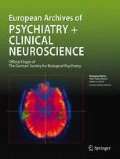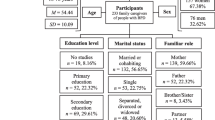Abstract
Objective
The aim of the study was to identify the best predictors of the course of burden during a 2-year follow-up period. The study is part of the Munich 5-year follow-up study in relatives of first admitted patients with schizophrenia or depression.
Method
A cohort of 60 key relatives was assessed based on a transactional stress model concerning objective and subjective burden, well-being, self-rated symptoms and global satisfaction with life. The stressors were defined as patients’ illness variables, and the potential predictors included different dispositions and resources of the relatives. Effects were analyzed by regression models. In a first step, the main predictors of burden were identified at each assessment. In a second step, the resulting predictors were included in a Generalized Linear Modeling procedure.
Results
Caregivers’ burden improved significantly, but well-being and self-rated symptoms remained elevated. In the final regression model, expressed emotion, neuroticism, generalized negative stress response and life stressors resulted as the best predictors of burden. The effects were rather time invariant than time dependent.
Conclusion
In order to effectively work on long-standing unfavourable patterns of stress response, family interventions should be long-term and targeted to vulnerable caregivers who could be identified by virtue of their personality traits.
Similar content being viewed by others
References
American Psychiatric Association (1987) Diagnostic and statistical manual of mental disorders (DSM-III-R). Washington DC
Borkenau P, Ostendorf F (1993) NEO-Fünf-Faktoren Inventar (NEO-FFI) nach Costa und McCrae. Göttingen-Bern-Toronto-Seattle, Hogrefe
Boye B, Bentsen H, Ulstein I, Notland TH, Lersbryggen A, Lingjaerde O, Malt UF (2001) Relatives’ distress and patients’ symptoms and behaviours: a prospective study of patients with schizophrenia and their relatives. Acta Psychiatr Scand 104:42–50
Boye B, Malt UF (2002) Stress response symptoms in relatives of acutely admitted psychotic patients: a pilot study. Nord J Psychiatry 56:253–260
Brown S, Birtwistle J (1990) People with schizophrenia and their families. Fifteen-year outcome. Br J Psychiatry 173:139–144
Connor-Smith JK, Flachsbart C (2007) Relations between personality and coping: a meta-analysis. J Pers Soc Psychol 93:1080–1107
Derogatis LR (1977) SCL-90-R, administration, scoring and procedures. Manual for the (revised) version. John Hopkins University School of Medicine, Baltimore
Ferring D, Filipp S-H (1989) Bewältigung kritischer Lebensereignisse: Erste Erfahrungen mit einer deutschsprachigen version der “ways of coping checklist”. Zeitschrift für Differentielle und Diagnostische Psychologie 10:189–199
Folkman S, Lazarus RS (1989) An analysis of coping in a middle-aged community sample. J Health Soc Behav 21:219–239
Hamilton M (1960) A rating scale for depression. J Neurol Neurosurg Psychiatry 23:56–62
Janke W, Erdmann G (1997) Streßverarbeitungsfragebogen. Göttingen-Bern-Toronto-Seattle: Hogrefe
Joyce J, Leese M, Kuipers E, Szmukler G, Harris T, Staples E (2003) Evaluating a model of caregiving for people with psychosis. Soc Psychiatry Psychiatr Epidemiol 38:189–195
Kay SR, Fiszbein A, Opler LA (1987) The positive and negative syndrome scale (PANSS) for schizophrenia. Schizophr Bull 13:261–276
Krampen G (1991) Fragebogen zu Kompetenz-und Kontrollüberzeugungen (FKK). Göttingen-Toronto-Zürich: Hogrefe
Magana AB, Goldstein MJ, Karno M, et al (1986) A brief method for assessing expressed emotion in relatives of psychiatric patients. Psychiatr Res 17:203–212
Magliano L, Fadden G, Economou M, Held T, Xavier M, Guarneri M, Malangone C, Marasco C, Maj M (2000) Family burden and coping strategies in schizophrenia: 1-year follow-up data from the BIOMED I study. Soc Psychiatry Psychiatr Epidemiol 35:109–115
Möller-Leimkühler AM (2005) Burden of relatives and predictors of burden. Baseline results from the Munich 5-yeat-follow up study on relatives of first hospitalized patients with schizophrenia or depression. Eur Arch Psychiatry Clin Neurosci 255:223–231
Möller-Leimkühler AM (2006) Multivariate prediction of realtives’ stress outcome 1 year after first hospitalization of schizophrenic and depressed patients. Eur Arch Psychiatry Clin Neurosci 256:122–130
Möller-Leimkühler AM, Wohlgemuth N (in preparation) The coping-stress response in caregivers of first admitted psychiatric patients: a qualitative analysis
Parabiaghi A, Lasalvia A, Bonetto C et al (2007) Predictors of changes in caregiving burden in people with schizophrenia: a 3-year follow-up study in a community mental health service. Acta Psychiatr Scand 116(suppl. 437):66–76
Pai S, Kapur RL (1981) The burden on the family of a psychiatric patient: development of an interview schedule. Br J Psychiatr 138:332–335
Pearlin LI, Mullan JT, Semple SJ, Skaff MM (1990) Caregiving and the stress process: an overview of concepts and their measures. Gerontologist 30:583–594
Priebe S, Gruyters T, Heinze M, Hoffmann C, Jäkel A (1995) Subjektive Evaluationskriterien in der psychiatrischen Versorgung—Erhebungsmethoden für Forschung und Praxis. Psychiatr Prax 22:140–144
Ray J, Kulhara P, Avasthi A (1991) Social burden of positive and negative schizophrenia. Int J Soc Psychiatr 37:242–250
Roick C, Heider D, Toumi M, Angermeyer MC (2006) The impact of caregivers’ characteristics, patients’ conditions and regional differences on family burden in schizophrenia: a longitudinal analysis. Acta Psychiatr Scand 114:363–374
Scazufca M, Kuipers E (1998) Stability of expressed emotion in relatives of those with schizophrenia and its relationship with burden of care and perception of patient’s social functioning. Psychol Med 28:453–461
Sommer G, Frydrich T (1989) Soziale Unterstützung: Diagnostik, Konzepte, F-SOZU. Dt. Ges. für Verhaltenstherapie, Tübingen
The Scottish Schizophrenia Research Group (1992) The Scottish first episode schizophrenia study VIII. Five-year follow-up: clinical and psychosocial findings. Br J Psychiatry 161:496–500
Wiedemann G, Rayki O, Feinstein E, Hahlweg K (2002) The family questionnaire: development and validation of a new self-report scale for assessing expressed emotion. Psychiatr Res 109:265–279
Zerssen D von (1976) Die Befindlichkeitsskala: Parallelformen Bf-S und Bf-S’. Beltz-Test, Göttingen
Acknowledgments
Part of the research project was supported by the German Ministry of Education and Research in the context of the German Research Networks on Schizophrenia and Depression/Suicidality. The author thanks the involved psychiatrists for placing the clinical ratings of the patients at the author’s disposal.
Author information
Authors and Affiliations
Corresponding author
Rights and permissions
About this article
Cite this article
Möller-Leimkühler, A.M., Obermeier, M. Predicting caregiver burden in first admission psychiatric patients. Eur Arch Psychiatry Clin Neurosc 258, 406–413 (2008). https://doi.org/10.1007/s00406-008-0818-7
Received:
Accepted:
Published:
Issue Date:
DOI: https://doi.org/10.1007/s00406-008-0818-7




